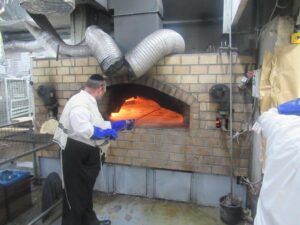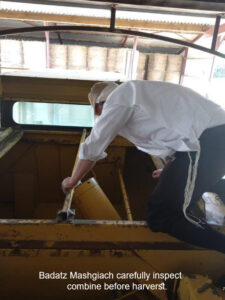The difficulty in making gluten-free matzah
Gluten-free oat matzah produced by Tiv Hashibolet is made from organic oat flour from a field carefully selected to grow oat grains for Tiv Hashibolet.
Oats are one of the five types of grain and therefore the bracha made on it is Hamotzi and it can be used to fulfill the obligation of eating matza on the Seder night.
Despite the difficulty in producing gluten-free oat matzah, the Tiv Hashibolet company produces round hand matzah and square machine matzah every year at a high level of quality and kosher standard.
There are many difficulties in the production of gluten-free oat matzah. In baking gluten-free matzah with a high kashrut standard, there is sometimes up to 50% production waste, which makes the matzah quite expensive. After the baking, the matzah breaks easily because it does not have the gluten that makes it stick.
Especially in the hand matzah production, a large percentage of the matzot are broken matzot. We try to pack only whole matzot, but we cannot be sure that the matzot remain intact until the customer’s home. There is another great difficulty in making matzah by hand. It takes great expertise to roll out the dough uniformly without it crumbling, so sometimes there are places in the matzah that are thicker or thinner, the result of this is places in the matzoh that are either less crispy or a little burnt.
 Already several years ago, the Tiv Hashibolet company succeeded in producing high kashrut standard matzah with the machine stopping every eighteen minutes, thin and tasty matzah. This is quite challenging in gluten- free matzah production, requiring special methods and techniques. Cleaning the machine after baking these matzot is very complicated because the dough is sticky, and takes a long time, about an hour of cleaning for every eighteen minutes of baking.
Already several years ago, the Tiv Hashibolet company succeeded in producing high kashrut standard matzah with the machine stopping every eighteen minutes, thin and tasty matzah. This is quite challenging in gluten- free matzah production, requiring special methods and techniques. Cleaning the machine after baking these matzot is very complicated because the dough is sticky, and takes a long time, about an hour of cleaning for every eighteen minutes of baking.
Growing the Grain and Treatment of the Bitter Enzymes
Oats grow naturally without gluten, but keeping the grain gluten free while growing is not easy. One bird dropping a grain of wheat from another field or ants bringing grains with them can ruin the whole field. During the cultivation and especially at the beginning of the cultivation, it is necessary to check the entire field carefully several times to make sure that no foreign seed has entered the field.
All oats have bitter enzymes, so sometimes there is an aftertaste in matzah. (In the oats that you buy in the market, there are several methods of how to handle the matter so that there is no bitterness. The most common method is a steaming process, which of course is not done in Pesach oats for fear of it becoming Chametz. There is another method to handle these enzymes and that is by roasting the kernels.)
In Tiv Hashibolet’s matzah production, the grains do not go through any heating process, so of course it is a big challenge to produce matzah without bitterness. We don’t always manage to completely control the aftertaste, but at least 90% of our matzot are without bitterness at all. We use special methods during grinding and production to ensure that the oats do not oxidize so that there is almost no aftertaste in the matzah. We make improvements every year and hope we will soon be able to ensure no aftertaste or bitterness in any of our matzot.
To improve the taste and crispiness of the matzah it is advisable to heat up the matzah for a few minutes in a Pesach oven or hotplate.
Ensuring a Production Free of Gluten
For logistic reasons, we indicate on the box that the product may contain gluten. Despite this, our oat kernels are laboratory tested and certified gluten-free. However, it is not sufficient just to harvest gluten free oats, gluten can contaminate the oats during the peeling, grinding of the flour, and baking of the matzah. We do not compromise on the quality of the oats and we do not compromise on health. We make great efforts to ensure that the place where the flour is prepared is sterile. Every matzah bakery has wheat matzot baked with gluten, so we invest a lot of effort in preparing the bakery for baking. In special areas of the bakery, we use devices to remove the gluten, wash the walls and ceiling and then cover both the walls and ceiling.
During the production of the matzah, we test the matzah for gluten with an ELISA test and then we also send a sample to a laboratory recognized by the Ministry of Health to make sure that the matzot are in fact gluten free.
Uncompromising Level of Kashrut
 The kernels of Tiv Hashibolet are carefully watched from the harvest, under the strict supervision of the Bedatz Eida Hachareidit. A special experienced team of mashgichim on behalf of the Bedatz fly abroad to monitor every process; the harvesting, peeling and packaging of the grains. The Bedatz supervises the entire process until after packaging. Tiv Hashibolet brings an experienced team to supervise the complicated baking of the matzot. Since there is no gluten in the product, it is very difficult to make matzah with a high kashrut standard from a dough that is sticky by nature, dries quickly and crumbles easily. The production of machine matzoh in particular requires special experience, therefore at the machine matzah production there is a professional team to take care of all the production details at the highest level. The production of handmade round matzah as well requires special expertise.
The kernels of Tiv Hashibolet are carefully watched from the harvest, under the strict supervision of the Bedatz Eida Hachareidit. A special experienced team of mashgichim on behalf of the Bedatz fly abroad to monitor every process; the harvesting, peeling and packaging of the grains. The Bedatz supervises the entire process until after packaging. Tiv Hashibolet brings an experienced team to supervise the complicated baking of the matzot. Since there is no gluten in the product, it is very difficult to make matzah with a high kashrut standard from a dough that is sticky by nature, dries quickly and crumbles easily. The production of machine matzoh in particular requires special experience, therefore at the machine matzah production there is a professional team to take care of all the production details at the highest level. The production of handmade round matzah as well requires special expertise.
We challenge everyone to try at home after Pesach to take only oat flour and water and see if you can make a workable dough!
